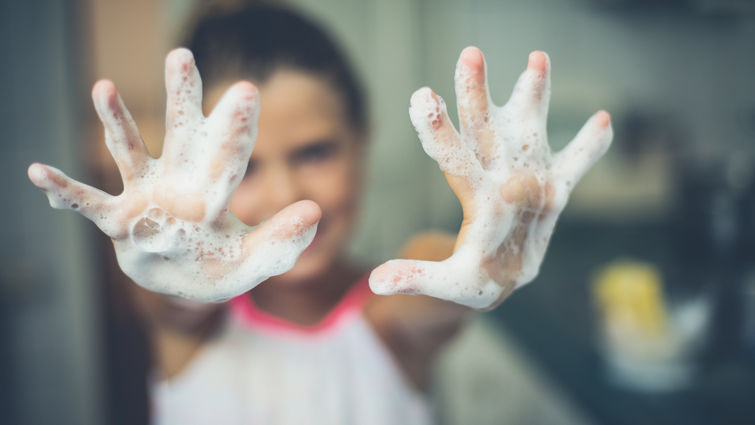
Public health tips for kids and teens to follow during international pandemic
With the state of California on state-wide lockdown and the declaration of COVID-19 as a pandemic by The World Health Organization, parents may be wondering during these uncertain times what experts have to say about the health impact on children and teens. The Centers for Disease Control and Prevention (CDC) states current evidence suggests children and teens are less at risk for COVID-19 than adults. While some children and infants have been sick with COVID-19, adults make up most of the cases.
Alexandra Clark, MD, division chief of general pediatrics at Loma Linda University Children’s Health, says teens and kids will have an impact on limiting the spread of COVID-19 and can start with these three tips.
Have a hard conversation
Clark says it is critical to remember that children and teens respond to and process social situations, such as COVID-19, differently than adults do. “The younger the child is, the more emotional trauma or stress they can perceive if they feel like the family is in panic mode. As parents, we have an obligation to discuss this pandemic with them in a calm and reasonable manner while stressing the importance of following the guidelines for social distancing.”
Regardless of age, Clark says parents should include the following in their conversation with their children and teens:
· The virus spreads easily and we don’t know everything about it yet.
· We do know people can get better.
· Demonstrate empathy to those who are affected with a statement like “for those who don’t get better, who get sick or hurt by this virus, our hearts and prayers as a family go out to them.”
· Remind them, most importantly, that you as a family are taking steps to ensure they stay safe and healthy and that they are vital to helping the community stay safe.
“For parents, it's having that conversation that this is changing every day, there is some information we don’t know but we aren’t going to panic, and we are going to stay calm doing this together. That is the conversation we want parents to have with their kids.”
Empower social distancing and social responsibility
Teens, in particular, might not see the immediate danger of COVID-19 because they are least susceptible and for those reasons may still think it is okay to participate in social activities and go out and about. But, they can also be asymptomatic — meaning they show no signs or symptoms but still transmit the virus. For these reasons, social distancing will be critical in slowing the virus, and Clark wants teens to know they have the power to make an impact.
“Teens right now are a group of people who are genuinely concerned about making a difference in the world, and this is an opportunity for them to be forward-thinking,” Clark says. “If they consider their grandparents, loved ones, and those with compromised immune systems — and unitedly feel empowered to practice social distancing for the greater social good — I think teens have an amazing ability to be a big player for us in the medical world right now.”
Teens have an amazing ability to be a big player for us in the medical world right now.
Clark adds that teens can achieve this by using their social savvy backgrounds to spread accurate information, create positive video messages or connect with their friends virtually. Socially isolating does not mean isolating socially! Use the media platforms that exist to connect with friends, do virtual parties, dance offs, or so many other creative things.
Another tip she adds is using their good health to help the elderly. “We know that during this time the elderly are most at-risk, and supplies being hoarded in some regions puts them more at risk,” Clark says. “Check in on them. See if they need a store run. If you are showing no symptoms, you can help them with it.” Clark says it’s OK to volunteer to do this as long as you show no symptoms. Just make sure you properly sanitize your hands and deliver the supplies following proper social distance.
Make these safety steps fun and not a chore
In these unprecedented times, it can seem difficult to make common health etiquette fun. But Clark says things such as handwashing, avoiding touching the face and covering your cough will be vital to the success of slowing the virus. For the young children, she recommends turning hygiene practices into fun moments or games if possible. While washing hands, for example, see who can make the most bubbles while singing “Happy Birthday” twice. Another is giving out weird stickers if you touch your face. Or you can have your children pretend to be like Batman when he swings his cape to cover his face to encourage them to swing their arm around their body to cough into the elbow. There are a lot of wonderful web resources popping up daily with great ideas for families.
“There isn’t a perfect solution, but frequent reminders delivered in a positive way, not nagging, being interactive and encouraging fun is going to be what helps kids the most.”
Clark says for teens at home practicing social distancing, this is a time for them to pick up a new hobby like painting, music, poetry, group gaming or getting ahead on studying for SATs. For families, she adds it’s still important to get sunshine and recommends gardening and short walks to stay healthy and happy.
Final thoughts on hunkering down
Clark says it’s important to remember that what we know about COVID-19 is changing daily. Our ability to hunker down will make a difference in this state and in this country. She urges families to stay up-to-date on COVID-19 by visiting the CDC website. You can also visit the Loma Linda University Health coronavirus website to see facts and preventative tips to keep you and your family healthy.
